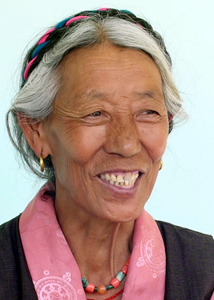Name: Dolma Yangzom
(Alias: No)
Gender: Female
Interview Age: 71
Date of Birth: 1946
Birthplace: Palangthi, Kham, Tibet
Year Left Tibet: 2002
Profession: Farming
Monk/Nun: No
Political Prisoner: No

Interview No.: 33U
Date: 2017-04-03
Language: Tibetan
Location: Dekyiling Tibetan Settlement, Sahastradhara, Uttarakhand, India
Categories: Chinese Invasion and Occupation
Keywords: Chinese -- first appearance of, Chinese -- oppression under, Chinese rule -- life under, commune system, Kham
Summary:
Dolma Yangzom was born in Palangthi in Kham Province in 1946. Her mother passed away when she was only 6 months old and a paternal aunt raised her after her father remarried. She and her aunt lived alone in a small house and worked hard. Dolma Yangzom began working at the age of 8 as a farmer for the commune, which formed in her village after the Chinese invaded the region in 1954.
When the Chinese first appeared in Dolma Yangzom's village the terrified people ran to Zizi Monastery for safety, but many were shot and killed. The Chinese confiscated land and houses from the rich and distributed these to the poor people. The commune enforced a system of community farming and dining, but only lasted for a few years because morale was poor and harvests were unsuccessful.
Dolma Yangzom recalls that restrictions were imposed on religious practice. Her aunt used to feign illness in order to perform prayers on special days of the month. Only a few monks remained in the area because the majority was forced to become laymen after the Chinese destroyed the monasteries. Dolma Yangzom wanted her sons to get a good education and hired people to take them to India, where she later joined them in exile.
Interview Team:
- Marcella Adamski (Interviewer)
- Tenzin Yangchen (Interpreter)
- Tenzin Choenyi (Videographer)

